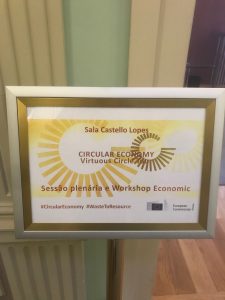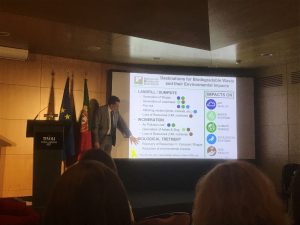Tivoli Congress Centre, Lisbon
 Last Friday Cresting researchers Natacha Klein and Katelin Opferkuch attended a conference titled “Virtuous Circles: Building a Circular Economy in Portugal” hosted by the European Commission in Lisbon. Speakers from Industry and Government, both Portuguese and international, were invited to discuss the present reality of waste management in Portugal in relation to progress seen in other European Union countries.
Last Friday Cresting researchers Natacha Klein and Katelin Opferkuch attended a conference titled “Virtuous Circles: Building a Circular Economy in Portugal” hosted by the European Commission in Lisbon. Speakers from Industry and Government, both Portuguese and international, were invited to discuss the present reality of waste management in Portugal in relation to progress seen in other European Union countries.
The debates centered on achievements made since the development of the Portuguese Action Plan for Circular Economy in 2017, as well as key opportunities for improvement in the coming years. Speakers from non-Portuguese contexts provided valuable recommendations to drive investment for local circular projects such as; adapting traditional Portuguese industrial activities to increase re-manufacturing of materials and implementing a national resource efficiency strategy in order to increase competitiveness of Portuguese industry.
One major takeaway was the urgent need for stronger regulatory bodies to enforce fines for actors who are not complying with waste management legislation. It was repeatedly discussed that non-compliance in Portugal has no consequences for companies.
Currently, Lisbon’s recycling rate is at a low 33% of total waste collected, forcing the city to implement ambitious schemes to improve all stages of waste management. One exciting update will be the increase in the number of local eco-centres throughout the metropolitan region of Lisbon. At these eco-centres citizens can access repair services for household  items, as well as act as collection points for unusual materials to be recycled. Other Portuguese circular economy initiatives demonstrated how the country is willing to take circularity to the next level.
items, as well as act as collection points for unusual materials to be recycled. Other Portuguese circular economy initiatives demonstrated how the country is willing to take circularity to the next level.
Overall, there was a strong sense of support for circular economy initiatives from the Portuguese Government. So much so, that the Minister of Environment and Energy Transition – João Pedro Matos Fernande declared that “linearity is no longer an option.”

